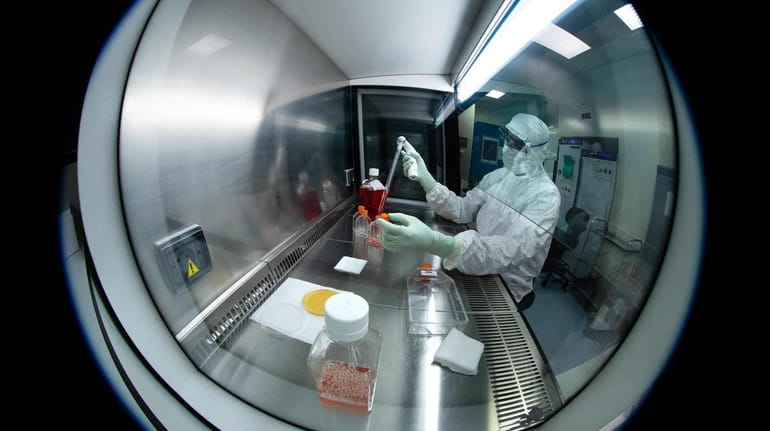The truth and politics of vaccination

A lab technician performs tests under a hood, using reagent bottles at a French pharmaceutical company Sanofi's laboratory in Val de Reuil. Credit: AFP via Getty Images/JOEL SAGET
Years ago, during a debate with my father over public health in poor nations, he scored the winning point with an unforgettable comment.
"Lane," he said gently, "if the cure to AIDS was one glass of clean water daily, 50% of the world wouldn’t be able to access it."
That’s gotten better in the 35 years since. Today, just one in every nine residents of Earth lacks clean drinking water … and this lack causes 3.5 million deaths annually, according to the World Health Organization.
We speak of protecting the world from COVID-19, but wishing doesn't make it so. Much of the world can't even be protected from diarrhea.
So should we vaccinate the world? Can we? We’d need these questions answered to know:
- What is the best way to get people in poor nations vaccinated?
- Should political leaders ever put the needs of the larger world above their constituents?
- What if the only way to protect Americans is by helping other nations?
The United States is being assailed as a hogger of both vaccines and vaccine technology. The idea that we’re hoarding doses is undercut, at least in part, by the statistical reality that we are ranked only 40th among the world’s nations in percentage of residents vaccinated.
But we do have a stockpile of hundreds of millions of shots. And we are granting third doses to lots of Americans while most of the world’s people have yet to get their first.
Even so, the big debate now is less whether to give away our doses to other nations, complicated by claims that the poorest nations wouldn't be able to get such doses into arms even if they had them, and more whether the companies that developed the vaccines and manufacturing technology should give that knowledge to other nations to help themselves.
Supporters of sharing know-how say these poor nations can manufacture the vaccine themselves, and letting them do so is best. Opponents, including but not limited to the drug companies that developed the vaccines, say the process is too technologically complex for these nations to handle safely. They also argue that the more pressing problem is a shortage of raw materials, and that giving away patents that are so expensive to develop stifles research by eroding profits.
Both arguments are believable, and touted by credible experts, though the fact that governments paid for so much of the vaccine research makes the patent argument rather disingenuous.
We know this: If big pockets of the world remain unprotected, they will act as incubators to foster COVID variants that could be more deadly and more easily transmitted, and could keep plaguing rich, highly vaccinated nations like the United States.
We have to vaccinate the world, if only to protect Americans.
If the world can be most easily protected by sending doses, great. If the best way is sending formulas and technology and expertise, lovely. If the best answer is a mix, super.
But it’s political now, and muddied. The sides have formed, the advocates against the profiteers, the one-worlders against the "USA! USA!" gang.
In order to pick the right path with confidence, we’d have to be confident we’re being told the truth, by scientists and advocates and politicians and corporate leaders.
If the cure for what ails us were honesty from our leaders, and faith in them … how many of us would feel we had access to that cure?
Columnist Lane Filler's opinions are his own.

